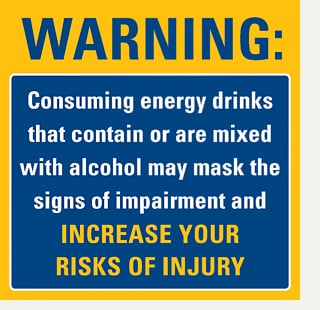Key points
- When caffeine is used with alcohol, it does not reduce the effects of alcohol on your body.
- Drinking alcohol that is mixed with caffeine could lead to more drinking, injury, and risks to your health.

Why it's an issue
Drinks that have both alcohol and caffeine can cause harm.
Caffeine is a substance that makes people feel alert. However, when used with alcohol, caffeine does not reduce the effects of alcohol on your body.
- It might make you feel like you have more energy, or you might feel like the alcohol is affecting you less.
- This could lead you to drink more alcohol and become more impaired, which increases your health risks.
- This could lead you to drink more alcohol and become more impaired, which increases your health risks.
- The effects of alcohol on your body do not change when it is used with caffeine.
Health risks
Drinking alcohol that is mixed with caffeine can make you drink more, which could make the effects from alcohol stronger. This could lead to alcohol-related health problems, damage to your body, and early death.
Other concerns with mixing alcohol and caffeine include:
- Higher blood pressure.
- Irregular heartbeat.
- Losing more water from your body (dehydration).
People who mix alcohol with energy drinks are more likely to report:
- Binge drinking.
- Unwanted or unprotected sex.
- Injuries, or damage to their body.
- Alcohol-impaired driving.
- Riding with a driver who had been drinking.
Caffeinated alcoholic beverages
Currently, the Food and Drug Administration (FDA) does not allow companies in the United States to sell caffeinated alcoholic drinks because of their health risks.
In the 2000s, caffeinated alcoholic drinks were pre-mixed drinks that combined alcohol, caffeine, and sometimes other substances to make you feel energized (stimulants). However, these drinks usually had more alcohol than a beer.
Caffeinated alcoholic drinks were heavily marketed to youth. The advertisements connected drinking with activities like action sports or risk-taking behaviors.
In November 2010, the FDA found that it was not safe to add caffeine to these alcoholic drinks. These alcoholic drinks no longer met the legal safety standards.12 Producers of caffeinated alcoholic drinks have since removed caffeine and other stimulants from their products.3
Even though companies no longer sell pre-mixed drinks that have caffeine and alcohol in the United States, people still mix alcohol with energy drinks, especially young people. For example, about one in five college students report using alcohol mixed with caffeinated energy drinks in the past year.4 However, it can be dangerous.
Keep in mind
- U.S. Food and Drug Administration. Caffeinated Alcoholic Beverages. November 17, 2010. Updated December 19, 2017. Accessed February 13, 2024. https://www.fda.gov/food/food-additives-petitions/caffeinated-alcoholic-beverages
- U.S. Federal Trade Commission. FTC sends warning letters to marketers of caffeinated alcohol drinks. November 17, 2010. Accessed February 13, 2024. https://www.ftc.gov/news-events/news/press-releases/2010/11/ftc-sends-warning-letters-marketers-caffeinated-alcohol-drinks
- U.S. Food and Drug Administration. Update on caffeinated alcohol beverages: FDA announces progress on removal of certain caffeinated alcoholic beverages from the market. November 24, 2010. Accessed February 13, 2024. http://wayback.archive-it.org/7993/20161024020218/https://www.fda.gov/NewsEvents/PublicHealthFocus/ucm234900.htm
- Schulenberg JE, Patrick ME, Johnston LD, O'Malley PM, Bachman JG, Miech RA. Monitoring the Future: National Survey Results on Drug Use, 1975-2020: Volume II, College Students and Adults Ages 19-60. Institute for Social Research, The University of Michigan; 2021. Accessed February 13, 2024. https://monitoringthefuture.org/wp-content/uploads/2022/08/mtf-vol2_2020.pdf
